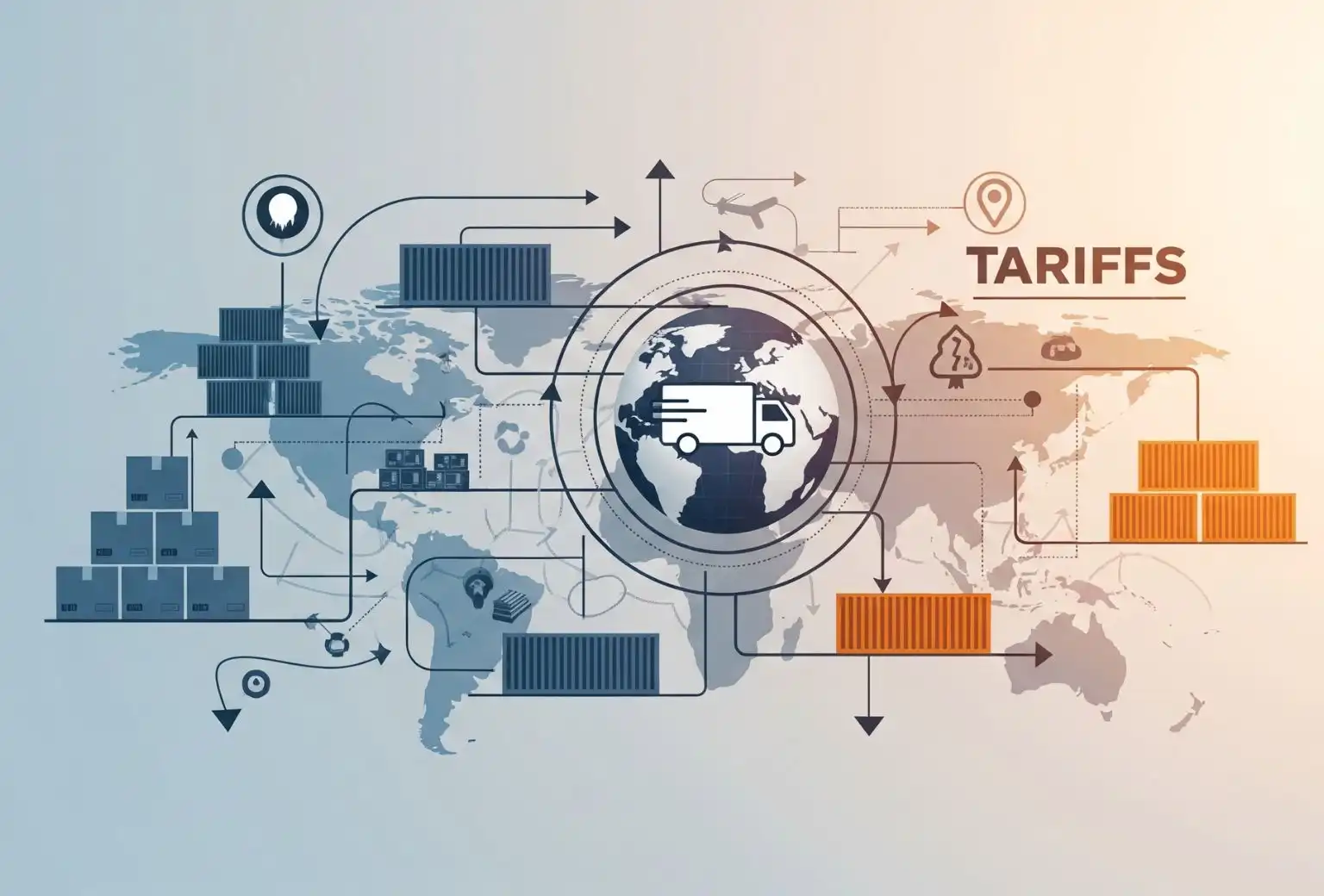HOW THE IMPACT OF TARIFFS ON RELOCATION IS RESHAPING GLOBAL MOBILITY TRENDS

Introduction
In today’s unpredictable global economy, the impact of tariffs on relocation has become more than just a footnote in international business strategy—it’s now a key determinant in planning cross-border moves. Trade wars, once seen as policy-level conflicts, now ripple through the very personal process of international relocation.
For individuals and companies alike, moving abroad isn’t just about packing and shipping—it’s about navigating the invisible walls of tariffs, protectionism, and economic retaliation. This blog explores how trade policies are reshaping the mobility landscape and what it means for international relocation today.
When Trade Tensions Meet the Moving Industry
Over the last few years, the growing strain in global trade relations has made global relocation services tariffs increasingly difficult to manage. The unpredictable addition of duties, inspection requirements, and customs delays has disrupted the traditional timelines of international moves.
Previously, relocation professionals could predict shipping costs with some level of certainty. Today, with tariff structures changing overnight, even the most experienced service providers are often caught off guard. These shifts not only increase expenses but also complicate customs documentation and clearance.
The Evolving Landscape of Expat Assignments During Trade Wars
Multinational corporations are beginning to reconsider their strategies for global workforces because of the increasing foreign assignments and trade conflict problems. Postings that are long-term and international, previously considered a sign of prestige and potential, are now a source of risk with baggage, both literal and regulatory.
To cut costs and eliminate administrative hurdles, a lot of companies are now embracing shorter-term business travel and remote management strategies. This change affects the development of talent and morale of employees, while adding pressure to relocation companies to adjust their services accordingly.
Economic Nationalism and the Return of the Domestic Workforce
As economic nationalism's relocation strategies are gaining momentum, countries are encouraging local jobs and companies to bring their global operations back home. This has resulted in a dramatic decrease in the number of trans-border relocations, which directly affects the relocation demand.
Businesses that used to manage hundreds of relocations for expatriates each year are now focusing on local recruitment and on-the-ground training. This isn't merely about political gimmicks, but rather a cost-saving strategy in response to the increasing instability in the world.
Protectionism is Changing the DNA of International Moves
The current wave of protectionism international moves makes it harder for employees and families to shift smoothly across borders. Many countries are imposing restrictions on what is allowed in duty-free areas, tightening the requirements for documentation or placing a higher priority on customs-related inspections.
These changes may seem small in themselves, but taken together, they can extend the duration of a move from a few weeks to months. It's no longer sufficient for a relocation company to possess experience in logistics. They now have to be compliance and legal advisors as well.
Supply Chain Disruptions Are a Hidden Challenge in Relocation
Perhaps one of the most overlooked effects of trade wars is supply chain disruption and relocation. Tariffs on shipping materials, increased fuel charges, and bottlenecks at international ports have driven up transportation costs dramatically.
For customers, this often translates into delayed shipments, limited storage availability, or inflated packaging expenses. The relocation industry, which once prided itself on seamless execution, must now operate with a built-in margin of error, explaining these external challenges to clients in real time.
Counting the True Cost of International Relocation Tariffs
Calculating the cost of international relocation tariffs is no longer a simple line item in a budget spreadsheet. Today, costs vary significantly based on the destination, timing, trade agreements in place, and even political sentiment between nations.
HR teams must prepare for cost overruns, especially when relocating large teams or managing high-profile moves. Many companies are now bringing tariff analysts or external compliance advisors into the relocation planning process—an added expense, but often a necessary one.
Why Some Companies Are Changing Their Locations Altogether
With global pressure mounting, companies relocating due to trade wars are becoming more common. When entire markets are threatened by tariffs or trade restrictions, businesses are left with little choice but to move their operations—and people—elsewhere.
This kind of relocation demands a more holistic approach: not just moving goods and teams, but helping families adapt to new environments, managing local bureaucracy, and setting up new supply and staffing networks from scratch.
Geopolitical Concerns Now Shape Relocation Strategies
The geopolitical impact on international assignments cannot be overstated. Countries once considered strategic hubs are now avoided due to sanctions, diplomatic strain, or local unrest. For relocation companies, this means rerouting moves, renegotiating vendor contracts, and advising clients on alternative destinations.
What was once a straightforward A-to-B transition has turned into a multilayered chessboard of possibilities. This complexity highlights the importance of having seasoned professionals guiding the process with sensitivity and strategy.
The Future of Global Mobility and Tariff-Driven Change
The future of global mobility tariffs is uncertain, but it's certainly significant. Companies need to prepare for a more dispersed global model of relocation, in which regional shifts, trade agreements, and tariff deals determine how and where people relocate.
Service providers that are proactive - monitoring changes in policy, establishing global networks, and investing in regulatory compliance will be better prepared to assist their clients in this uncertain world.
Managing International Relocation in Times of Dispute
Companies are already figuring out how to handle international relocations when there are trade disputes. This involves scenario planning, risk assessments, and strategic alliances with relocation service providers who are aware of the intricacies of international trade. Learning and adaptability are essential, both for families and businesses that move.
In uncertain times, agility becomes your biggest asset. Organizations that treat relocation as a strategic priority—not just an operational task—will thrive even when trade wars flare.
The Final Word: Why Navigating Tariffs Needs a Trusted Partner
In the end, the impact of tariffs on relocation is far more than the increase in cost. It affects the entire journey. The impact is felt in the corporate boardroom and extends down to families packing their homes. From disruptions to supply chains to restricted and ever-changing trade routes and ever-changing regulations, moving is now a political and economic decision as well as a logistical issue. C
With PM Relocations (PMR), we know the ever-changing dynamics of global mobility. Our expertise lies in cost forecasting, compliance and individualized relocation strategies. We make sure that your international move isn't only possible, but seamless, regardless of the changing trade climate. If you're planning to move or exploring the potential of future global talent strategies, PMR can help you navigate the complexities of international relocation.
Our Blogs

BEST SCHOOLS IN CHENNAI: WHY THE CITY CONTINUES TO SHAPE INDIA’S EDUCATION FUTURE
Chennai has long been a powerhouse of quality education. From top CBSE and ICSE schools to globally recognized international institutions, the city continues to nurture academic excellence, discipline, and future-ready learning.

GUIDE TO THE BEST SCHOOLS IN AHMEDABAD FOR YOUR CHILD’S BRIGHT FUTURE
Choosing the right school is one of the most important decisions for every parent. This guide explores the best schools in Ahmedabad, highlighting academic excellence, modern facilities, and holistic development to help secure your child’s bright future.

EDUCATION FIRST: WHY BEST SCHOOLS IN BANGALORE CONTINUE TO ATTRACT FAMILIES ACROSS INDIA
Bangalore has become one of India’s most sought-after destinations for quality education, attracting families from across the country year after year. Known for its progressive learning environment, the city is home to some of the best CBSE, ICSE, and international schools, offering globally recognized curricula, experienced faculty, and state-of-the-art infrastructure. Beyond academics, these schools focus on holistic development, innovation, and extracurricular excellence—making Bangalore an ideal choice for parents who prioritize education while planning a long-term relocation for their family.



